Danbury Hospital Pathology-Anatomic and Clinical Residency Program
Welcome to the Department of Pathology here at Danbury Hospital.
Our program is a small family oriented community based program with 8-10 residents in total with faculty that are dedicated to teaching, mentoring and committed to supporting our residents well-being. The Pathology Residency is an integral part of the Department of pathology and plays an important role in the academic and clinical life of Nuvance Health Network.
Danbury Hospital is a 371-bed regional medical center and university teaching hospital affiliated with the University of Vermont College of Medicine and is one of seven hospitals in the Nuvance Health Network.
Our residents have the benefit of training in an integrated department with an integrated AP/CP curriculum. We offer strong academics and see a wide variety of cases. We provide residents the opportunity to participate in patient care, teaching rounds, and conferences. Residents will rotate in subspecialty rotations for Pediatrics, Neuropathology and Renal pathology at Yale New Haven Hospital, forensic pathology and toxicology at the Office of the Medical Examiner in Farmington and Blood Bank/Transfusion Medicine at Yale School of Laboratory Medicine. The residents also are offered elective months to choose a subspecialty of interest in a hospital of their choice. Our residents have consistently acquired one or more fellowships throughout the country.
Our mission is to create a nurturing, academic and instructional program that will develop and train the next generation of pathologists to be prepared to serve the Danbury community and beyond with empathy and excellence in diagnoses for the best and most comprehensive patient care. We will do this by instilling in them a passion and love of learning and research. They will learn through the experience and compassion of their teaching faculty, that each case is a person whose life they can positively affect through accurate diagnosis. To be good and trusted citizens in their communities and to bring honor to the legacy of the Pathology Residency Program here at Danbury Hospital.
Thank you for your interest in our residency program.
Ramapriya Vidhun, MD
Residency Program Director
Pathology Residency Program
The Danbury Hospital Pathology Residency program was established on April 27, 1955 and was the first residency program at Danbury Hospital. The program still enjoys continued accreditation by the Accreditation Council for Graduate Medical Education (ACGME). It is currently one of only three pathology residencies in the State of Connecticut. Danbury Hospital shares that privilege with Yale University and Hartford Hospital. Our program has a combined four-year anatomic and clinical pathology residency. The goal of the program has been to graduate pathologists and laboratory directors with superior technical competence, clinical acumen, and intellectual depth. The program acts as a focal point by drawing prospective residency applicants and attending physicians seeking a hybrid of academic medicine and community-based practice. The system chairman of the pathology and laboratory medicine service line is Daniel Cruser, MD. Dr. Cruser began his position here on the Danbury campus on October 1, 2020
Dr. Nader Okby serves as our Danbury Hospital laboratory medical director, hospital department chair, and system vice chair for the pathology and laboratory medicine service line. Dr. Okby recently joined Nuvance health in April 2022.
Dr. Cruser and Dr. Okby are committed to the Pathology Residency Program and the training of our future pathologists. Our pathologists remain the cornerstone of medical practice, providing the objective diagnostic and interpretive information necessary for definitive patient care. The pathologists in this department are excellent physicians, nearly half of whom are graduates of Danbury Hospital themselves. Our faculty is fully committed to the education of pathology residents and medical students based upon the premise of lifelong learning.
The current climate for a practicing pathologist is both challenging and constantly evolving. Pathologists play pivotal roles in all aspects of specimen processing, analysis, and reporting. In addition to running the clinical laboratory, blood bank, microbiology, surgical pathology, and autopsy service, pathologists also serve a crucial role as consultants acting as the “doctor’s doctor.” We have succeeded in our goal to prepare our graduating residents to adapt and perform in this ever-changing, demanding world.
Program Structure
Anatomic Pathology Curriculum
The Department of Pathology and Laboratory Medicine at Danbury Hospital provides a well-integrated training program in Anatomical Pathology that includes:
- Orientation in Clinical and Anatomical Pathology (8 weeks combined)
- Autopsy pathology
- Surgical pathology
- Cytology – 3 months (2 months PGY3 – 1 month PGY4)
- Forensic pathology (1 month)
- Anatomical Pathology HOT SEAT (PGY4) – 2 month
Opportunity to rotate at Yale University, Elective Rotation, Western Connecticut Research Lab (mandatory Research rotation), and the Office of the Medical Examiner is included in the curriculum.
Autopsy Pathology Education
This aspect of the anatomic pathology education is accomplished by providing hands-on experience in all aspects of autopsy pathology, combined with gross pathology lectures and case presentations at the multiheaded scope. The residents mostly perform autopsies during their PGY1 and PGY2 years.
They also have a dedicated one month OCME/Autopsy rotation during their PGY2 year. We send our residents to Norwalk Hospital to perform autopsies so the resident can acquire the 30 required autopsies in their residencies and to give them a rounded Autopsy experience between the two hospitals. We work hand in hand with Norwalk hospital for our residents to attain the adequate autopsy numbers.
The program facilitates the autopsy number requirements by combining the number of hospital-based autopsies, which approximately fifty (50) cases a year and a mandatory forensic pathology rotation at the Office of the Chief Medical Examiner of Connecticut. At the time that our residents graduate from the program, they have met their required numbers for ACGME/ABPath.
Pediatric Pathology Education
Pediatric Pathology education is covered by faculty lectures and case presentations. Over the period of four years, the lectures cover all aspects of pediatric pathology, including surgical and autopsy pathology provided by Yale faculty during the Peds/Neuro/Renal rotation. Pediatric autopsy cases at our institution are performed by our residents under the guidance of the attending pathologists; microscopic review of fetal autopsy and placentas are performed in a timely manner. The Pediatric Pathology Rotation is performed at Yale University as a required rotation. There are also didactic lectures provided by Yale faculty through their four years of training.
We also have a pediatric pathology faculty from Yale University. The faculty presents interesting and unusual cases from their institution. The resident also has a mandatory rotation at Yale for Peds/Neuro/Renal for one month in their PGY4 year.
Neuropathology Education
During the Required Elective rotation at Yale, two of the four week rotation are dedicated to Neuropathology. Residents’ education in the field of neuropathology is comprised of a combination of surgical cases, Autopsy cases, and academic lectures given by our faculty at Danbury Hospital, faculty from the Yale Department of Pathology and The Office of the Chief Medical Examiner (OCME).
Anatomical Pathology Schedule – 24 Months
- Surgical Pathology – 18 months (with two months of Hot Seat in the PGY4 year to prepare for fellowships and future employment)
- Cytology – 3 months
- Anatomical Pathology Orientation – 6 weeks
- OCME – 1 month
Clinical Pathology Curriculum
Clinical pathology (CP) training at Danbury Hospital requires rotation to all clinical departments. Residents attend formal lectures given by physicians and managers of the departments and interact daily with the clinicians to gain experience in the application of laboratory data to pertinent clinical problems.
In the second year of the rotation, the resident assumes more teaching, administrative, and clinical responsibilities and has the opportunity to conduct an in-depth research project.
General Clinical Pathology Training Requirements
Residents who want to be board-certified from a combined anatomic/clinical pathology (AP/CP) residency training program must complete a minimum of 18 months of CP training according to the American Board of Pathology guidelines
Residents who desire to be board-certified in clinical pathology only must complete a minimum of three years of CP training.
During the four-year residency, the CP training will consist of a core curriculum where laboratory rotations are divided between the major disciplines of clinical pathology, including:
- Microbiology
- Chemistry
- Hematopathology
- Blood Banking
- Immunology
- Cytogenetics
- Lab Management
- Coagulation
- Molecular
- Informatics – 4 weeks (incorporated in Laboratory Management rotation)
In these rotations, the resident is to become acquainted with the following aspects of every procedure covered:
- Principles
- Methodology
- Interpretation
- Quality control
After completion of the core curriculum, the subsequent year(s) of CP training will be individually tailored to allow the residents to focus in on particular areas of interest, as well as enable him or her to participate in an in-depth research project.
Graduated Case Sign-out Responsibilities
The resident shall assume gradual responsibility in signing out cases requiring a physician interpretation. These cases include:
- Bone marrow
- Histopathology reports (including special stains)
- Serum and urine protein electrophoresis
- Immunofixation electrophoresis
- Flow cytometry reports
- Molecular genetic reports
- Reviews of peripheral smears and body fluids
All cases are to be reviewed and signed by a staff pathologist (or PhD where appropriate).
Graduated Transfusion Service Coverage Responsibility
The resident shall have gradual responsibility in the following areas of transfusion medicine:
- Assessment of indications for a blood product transfusion
- Evaluation of transfusion reactions
- Evaluation of blood testing abnormalities, e.g., allo- and auto-antibodies.
The residents do a two-week rotation at Yale Transfusion Medicine department.
The above shall be accomplished under the direct supervision and guidance of the staff in house and at Yale.
On-Call Responsibilities
On-call coverage hours shall be divided equitably among the senior residents. The PGY1 residents have only “extended shifts” their first year. Residents are responsible for both AP and CP calls. AP calls include frozen sections and CP calls include Blood Bank and Clinical Laboratory calls. The residents shall be considered “first call” for the Blood Bank. That includes weekdays from 5 pm until 9 pm. The remaining overnight and weekend calls are covered by senior residents. There is always an attending pathologist who is on-call along with the residents.
Volume Guidelines for CP Credentialing
The resident is to complete a minimum number of procedures and test interpretations before he/she can be certified in Clinical Pathology by Danbury Hospital.
Laboratory Administration
The Clinical Pathology residents are given opportunities to learn about and participate in the administrative aspects of pathology.
- They are given a series of didactic lectures on laboratory and hospital administration.
- They participate in the management mentorship program and are expected to attend the individual lab section monthly meetings during their rotation in that laboratory.
- They attend our Clinical Pathology Quality Assurance Meetings.
Molecular Pathology Education
Our molecular pathology laboratory adheres to national standards and is equipped with state-of-the-art instrumentation to include:
- PCR and PCR in-situ thermocyclers
- Facilities for Florescent in-situ hybridization
Also, our residents are trained in evaluation and troubleshooting of molecular techniques. The curriculum is structured so as to cover the following topics:
- Basic nucleic acid biochemistry
- Specimen collection and storage
- Southern blot
- In vitro nucleic acid amplification
- DNA sequencing
- Clinical applications
Clinical Pathology Schedule – 19 months
- Clinical Orientation – 1 month
- Chemistry – 3 months
- Hematopathology – 3 months
- Cytogenetics – 1 month
- Molecular – 1 month
- Lab Management – 1 month
- Blood Bank – 2 months
- Coagulation – 1 month
- Immunology – 1 month
- Microbiology – 3 months
Miscellaneous Rotations -5 months
- Elective – 2 months
- Peds/Neuro (required) – 1 month (Yale)
- Research – 1 month
- Comprehensive (PGY4) – 1 month
Block Schedule
2021-2022
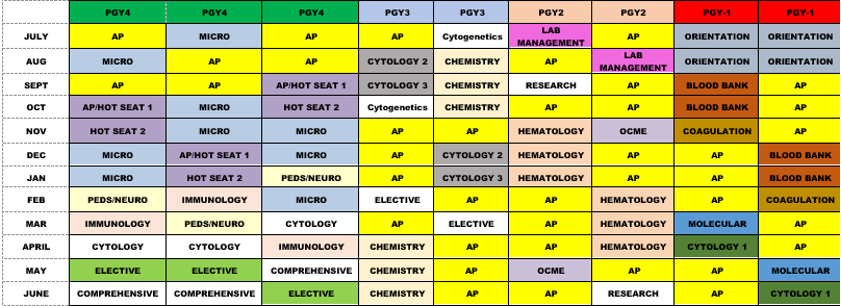
Global Health
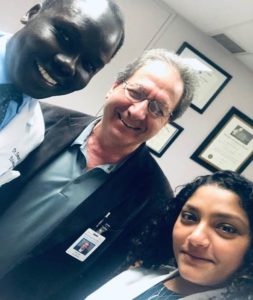

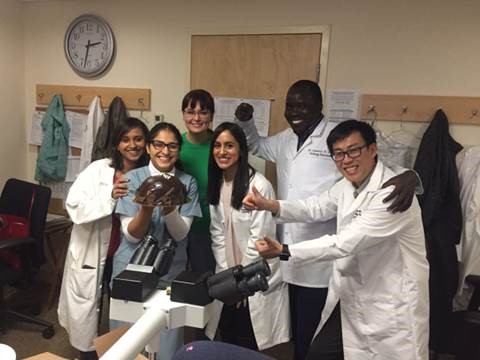
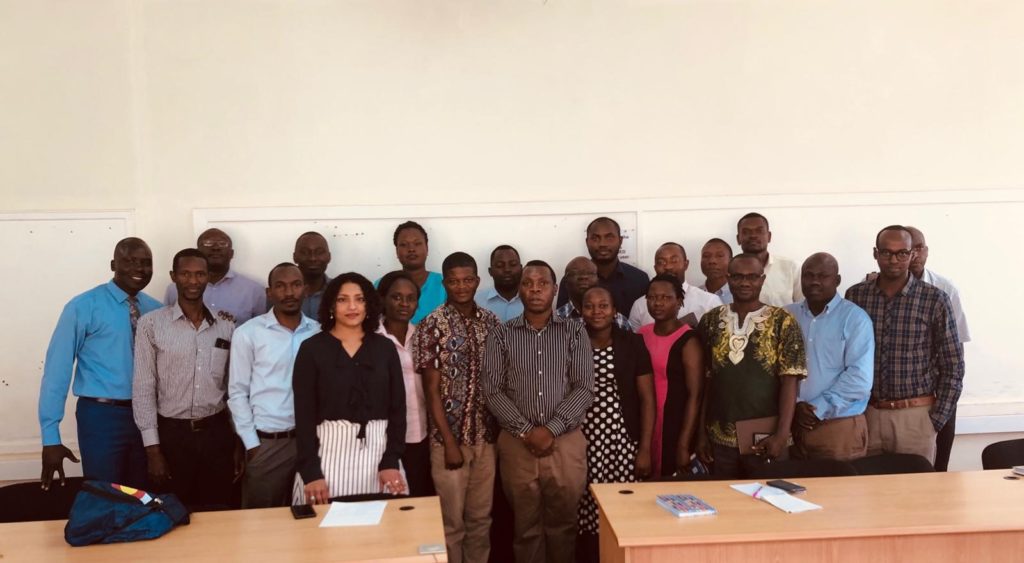
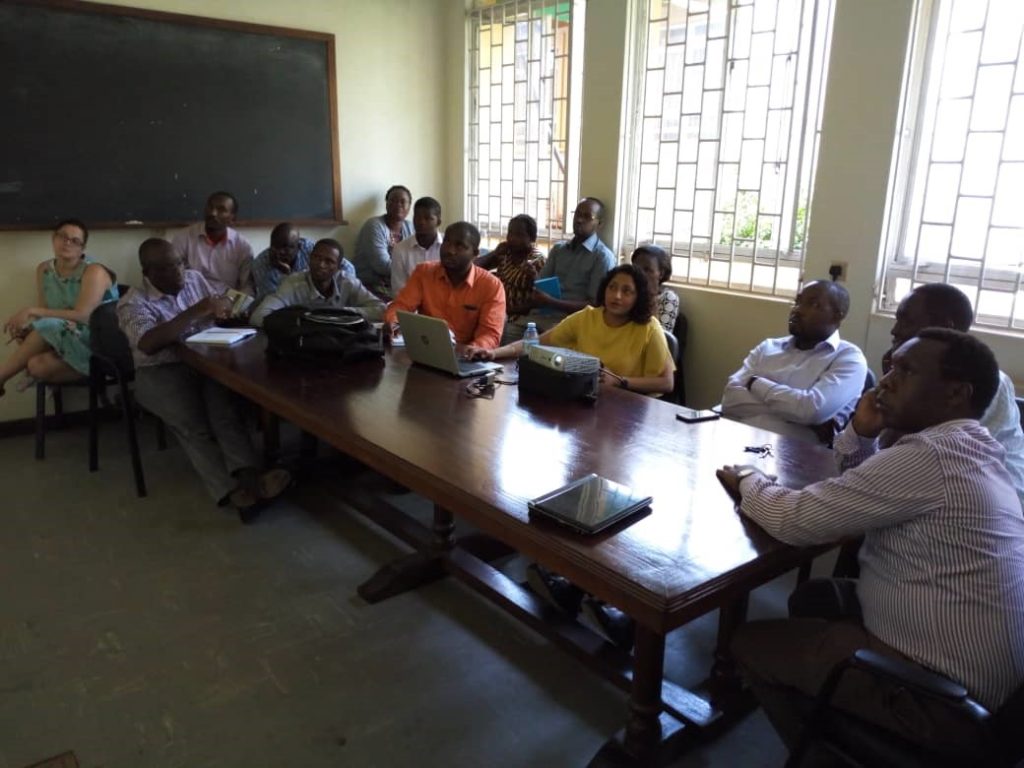
Dr. Vidhun and Dr. Sadigh have encouraged an exchange with Ugandan Pathology residents coming to our program and to study in the department. We have supplied them with textbooks to bring back, slides and memories of being a part of the residency program here at Danbury Hospital. In April of 2019, Dr. Vidhun visited Makerere University in Kampala, Uganda and presented a Grand Round on Molecular classification of Breast cancers and multi-headed slide and PowerPoint presentations on Breast pathology.
In the past four years, we have had three Ugandan pathology residents rotate with us from 8 to 11 month rotations. They are housed by the hospital and welcomed by the laboratory staff and faculty.
Dr. Vidhun and her residents are looking into travel to Uganda to teach and learn from their Ugandan cohorts. This has been a great opportunity for the residents explore new avenues in pathology training in a different country.
Dr. Vidhun spent four days teaching through the microscope and giving didactic lectures to the faculty and residents at Makerere University in Kampala, Uganda.
Wellness Initiatives
Wellness Week
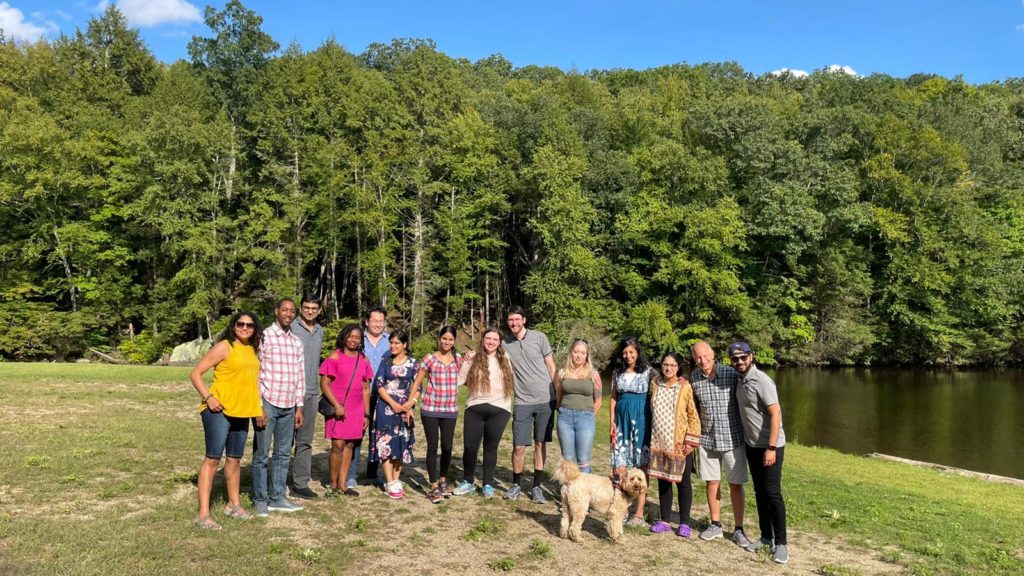
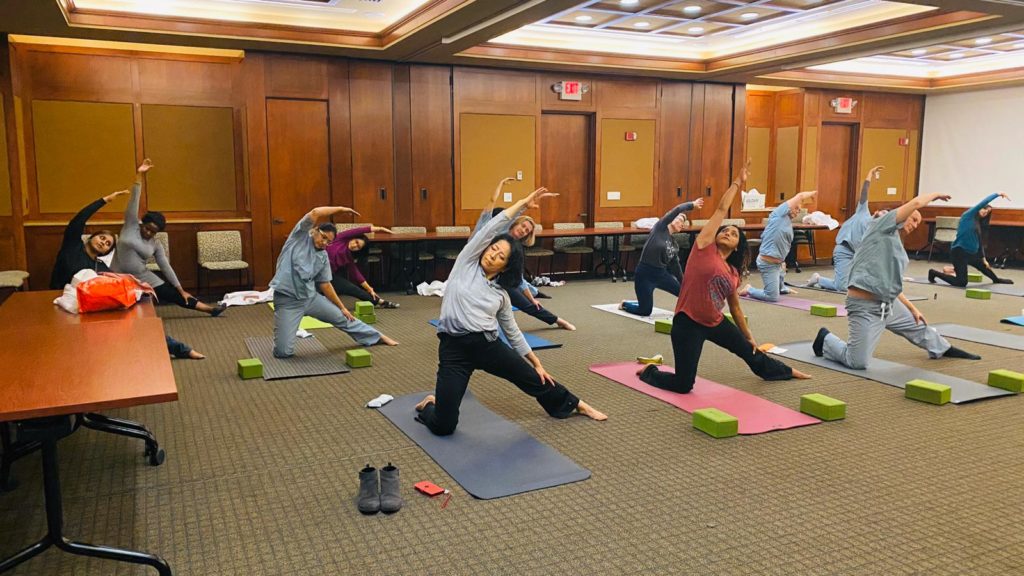
Yoga and learning about healthy eating and 5 minute meditation/relaxation sessions, ice cream social with game of taboo
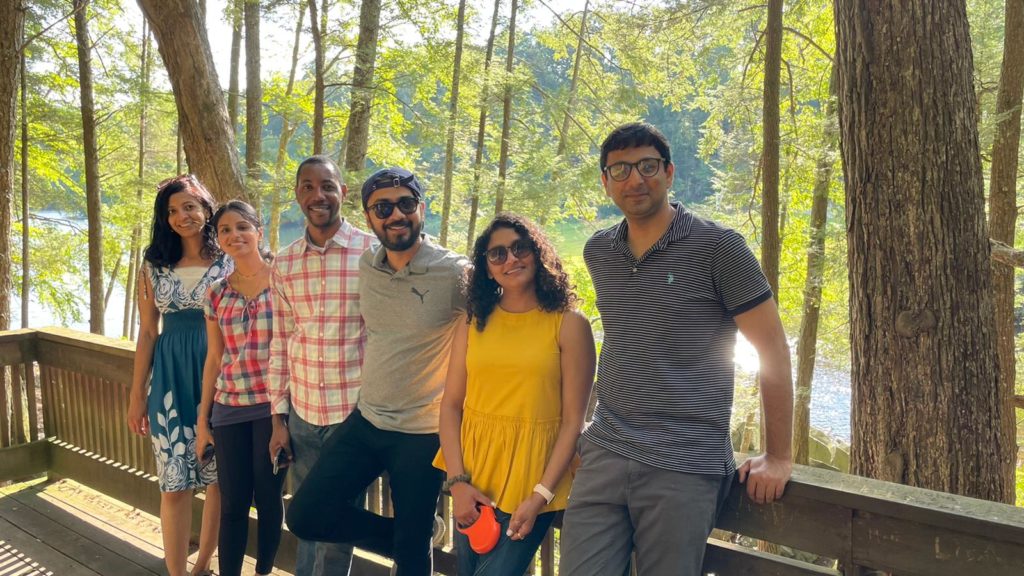
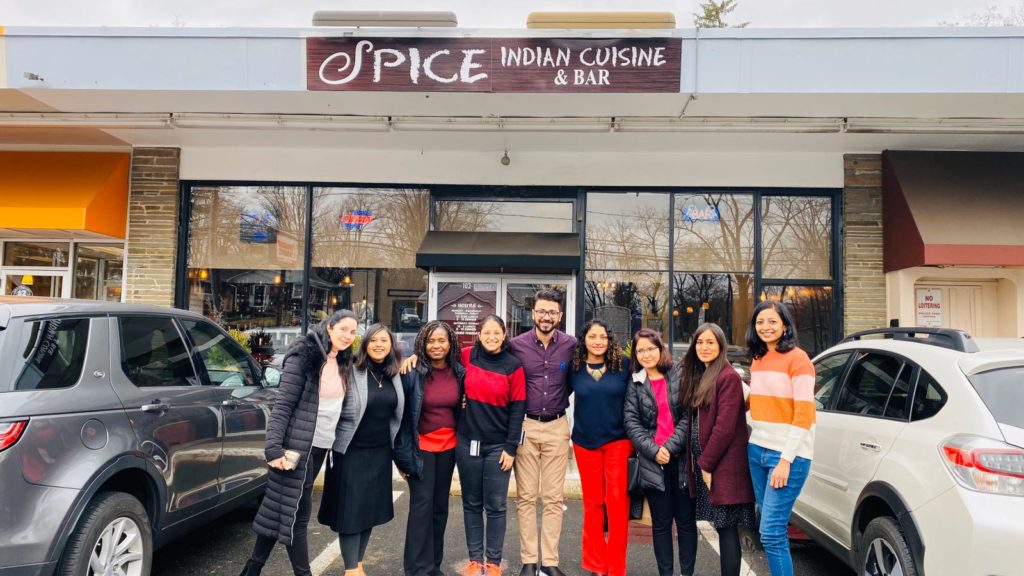
Faculty and Resident Wellness get together lunch…It is good to chill out
Graduate Fellowships
Class of 2023
Fnu Sandeep, MD- Mayo Clinic Surgical Pathology fellowship for AY 2023-2024
Jayalakshmi Venkateswaran, MD- Memorial Sloan Kettering Oncologic Surgical Pathology fellowship for AY 2023-2024, Memorial Sloan Kettering Cancer Center Hematopathology fellowship for AY 2024-2025
Susan Karki, MD- Roswell Park Cancer Institute, Oncologic Surgical Pathology fellowship for AY 2023-2024
Class of 2022
Olayinka Oluwaseyi, MD- MD Anderson, Houston, Texas – Surgical Oncologic Pathology fellowship AY 2022-2023, Gastrointestinal Pathology Fellowship Yale University, New Haven, Connecticut.
Fellowship for AY 2023-2024
Gagandeep Kaur, MD- Memorial Sloan Kettering Cancer center – Surgical Oncologic Pathology fellowship for AY 2022-2023, Breast / GYN Combined fellowship at University of Alabama for AY 2023-2024
Class of 2021
Debasmita Das, MD- GI Pathology at Beth Israel Deaconess medical Center, Harvard medical school Fellowship for AY2021-2022
Sapna Desai, MD- Forensic Pathology fellowship at the Connecticut Office of the Chief Medical Examiner AY2021-2022
Class of 2020
Hermineh Aramin, MD – Anderson Cancer Center, Houston, TX Surgical Pathology Fellowship 2020-2021; UCSD San Diego, CA Cytopathology Fellowship 2021-2022.
Class of 2019
Nataliya Sostin, MD – Yale University Medical School, New Haven, CT Blood Bank/Transfusion Medicine Fellowship 2019-2020. Employed at Yale
Quoc Nguyen, MD – Los Angeles, California Office of Medical Examiner, Forensic Fellowship 2019-2020; SUNY Upstate Cytopathology Fellowship 2020-2021.
Class of 2018
Ayaz Ghani, MD – Roswell Park Cancer Center, Buffalo, NY, Oncologic Surgical Pathology Fellowship; 2018-2019; University of Miami, Miami, FL, GI Fellowship. 2019-2020. Employed at Advanced pathology Solutions, Little Rock, AR
Olubunmi Shoyele, MD – Wayne State University, Detroit, Michigan, Cytology Fellowship. Employed at Summa Health System, Akron, OH
Class of 2017
Bryce Hatfield, MD – Virginia Commonwealth University, Surgical Pathology Fellowship, Richmond, VA 2017-2018; Virginia Commonwealth University, Cytopathology Fellowship, Richmond, VA 2018-2019. Employed at VCU
Vidarshi Muthukumarna, MD – Memorial Sloan-Kettering Cancer Center, Oncological Pathology Fellowship, New York, NY 2017-2018; Baylor University, Cytopathology Fellowship, Waco, TX 2018-2019. Employed at University of Texas Medical Branch
Class of 2016
Sheila Segura, MD – Memorial Sloan-Kettering Cancer Center, Surgical Oncologic Pathology Fellowship, New York, NY 2016-2017; Cytolpathology Fellowship, Montefiore Medical Center, Bronx, NY 2017-2018; GYN Fellowship, Memorial Sloan-Kettering Cancer Center, New York, NY 2018-2019. Employed University of Indiana
Evgeniya Angelova, MD – MD Anderson Cancer Center, Hematopathology Fellowship, Houston, TX 2016-2018 two year Fellowship. Employed in New Jersey
Tsetan Dolkar, MD – MD Anderson Cancer Center, Surgical Oncologic Pathology Fellowship, Houston, TX 2016-2017. Employed in Canada
Class of 2015
Saad Baqai, MD – Oncologic/Surgical Pathology Fellowship, Roswell Park, Buffalo, NY 2015-2016; Cytopathology Fellowship Roswell Park, Buffalo, NY 2016-2017. Employed in Buffalo University, NY.
Lauren Lippincott, DO – Forensic Pathology Fellowship – Louisville, Kentucky, Medical Examiner’s Office. 2015-2016. Employed hired 7/2016 by ME Office Louisville, Kentucky.
Brankica Paunovic, MD – Pediatric Pathology Fellowship, St. Christopher’s Children’s Hospital, Philadelphia, PA. 2015-2016; Forensic Pathology Fellowship – San Diego, CA Medical Examiner’s Office 2016-2017. Employed in OCME, San Diego, CA
Class of 2014
Jacqueline Pender, MD – Breast/GYN Fellowship – Univ. of Miami, Jackson Memorial Hospital; Forensic Pathologist. Employed – Miami, FL
Class of 2013
Sharmeen Mansoor, MD – Hematopathology Fellowship, Ohio State University, Columbus, OH; Oncologic Surgical Pathology Fellowship, Roswell Park Cancer Institute, Buffalo, NY. Employed in Canada
Class of 2012
Aarti Goswami, MD – Hematopathology Fellowship, Sloan-Kettering Memorial Hospital, New York, NY. Private Employment Texas currently
Asim Syed, MD – GI Fellowship, Beth Israel, New York, NY; Informatics Fellowship, UPMC, Pittsburgh, PA. Private Lab Employment, Florida
Junaid Baqai, MD – Hematopathology Fellowship, Wayne State; Surgical Oncologic Pathology Fellowship, Roswell Park. Employed Private job Laboratory Director, Taylorville Memorial Hospital, Michigan
Class of 2011
Anna Vischio, MD – Surgical Pathology Fellowship, Hartford Hospital, Hartford, CT; Cytology Pathology Fellowship, Hartford Hospital, Hartford, CT. Private Employment CT
Kilak Kesha, MD – Forensic Pathology Fellowship, Office of the Chief Medical Examiner, Baltimore, MD; Assistant Medical Examiner, Office of the Medical Examiner, Wayne County, Detroit, Michigan; Assistant Professor, Department of Pathology, University of Michigan, Ann Arbor, Michigan. Employed
Salman Ayub, MD – Hematopathology Fellowship, Wayne State, Detroit, MI. Employed
Class of 2010
Tatiana Perdomo, MD – Molecular Genetic Pathology Fellowship, Cedars Sinai Medical Center, Los Angeles, CA; Onocological Surgical Pathology Fellowship, Sloan Kettering Memorial Hospital New York, NY. Employed Associate Pathologist – Florida
Amarpreet Bhalla, MD – Currently employed 2016 – Hired by University of Buffalo, NY for a position in Cytology and General Surgical Pathology.
How to Apply
The Danbury Hospital Pathology Residency Program participates in the National Residency Matching Program (NRMP). We only accept applications and supporting documents through the Electronic Residency Application Service (ERAS). We look for candidates with excellent academic performance and a strong interest in pursuing pathology as the next step in their career. A complete application package should contain the following:
- ERAS Common Application Form (CAF)
- Personal Statement (1-2 pages)
- Official Medical School Transcripts
- Medical Student Performance Evaluation (Dean’s Letter)
- Three Letters of Reference/Recommendation – from faculty members, mentors, or supervisors who can address your performance and your commitment to the study of pathology
- Official copy of your United States Medical Licensing Examination scores
- Curriculum Vitae
- Current Photograph
- For documents that are not in English, include a translation by a qualified translator and an affidavit of accuracy acceptable to the hospital.
If you are an International Medical Graduate, we require:
- Educational Commission for Foreign Medical Graduates (ECFMG) Status Certificate (not Status Report)
- Visa Status
The Danbury Hospital Pathology Residency Program accepts foreign national physicians who meet the Danbury Hospital Eligibility and Selection requirements into its ACGME-accredited residency and fellowship programs. We welcome International Medical Graduates to apply to our residencies and will sponsor applicants for an H1-B visa.
Interviewing
Due to health concerns with the ongoing CoVid-19 pandemic (including concerns about new variants), no in-person interviews or visits are currently being conducted at Nuvance Health.
In addition to minimizing the national spread of CoVid-19, this creates a “level playing field” for any applicant who cannot travel due to personal health, school travel restrictions, or limitations from personal financial resources. We understand the value of seeing the people and place you are thinking about spending a significant portion of your life. The current decision for a virtual-only interview process this year was made with the health of our community and nation in mind as well as the goal of improving equity for all our applicants.
After reviewing applications in ERAS and identifying selected candidates for interviewing we will send out an e-mail with available dates for interviewing via our new scheduling management program called Thalamus.
What to expect for the interview day? You will meet one-on-one with the Program Director and have 4 additional interviews with other faculty members in different breakout sessions. You will also have the opportunity to speak with our current residents in a separate breakout session.
Post-interview communication: We are available for any questions that may arise after your interview day.
